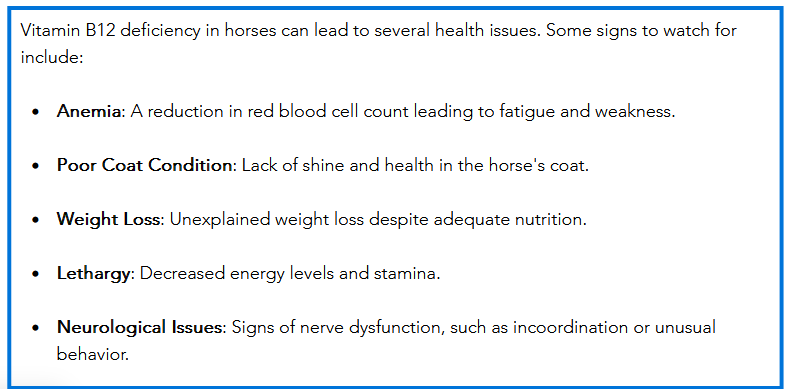Thank you Miss M! For a couple of things - comprehensive article on B12 ( biological properties of vitamin b12 )
and, amazing story about her dog, whose symptoms of long-standing irritable bowel symptoms (inappetence, dehydration, anxiety and fear) were alleviated in a matter of hours by administration of B12 along with SUB Q hydration. Thousands of dollars and years into unsuccessful treatments, veterinary intuition kicked in and B12 was called in for the rescue.
This triggered my slow-acting brain to go back to my question - could horses be suffering from B12 deficiency? Especially thinking of horses who choke, since choking came up as a B12-deficiency symptom in old people. For example, both of my aged parents. Not being able to swallow your food can really mess up your life. I will leave it at that.
My slow acting brain finally circled back to my last substack article (Please watch…), where I discovered Horsetech’s Sweatwerks supplement, which has a good dose of B12, along with other magical ingredients. Today I am looking at other B12 supplements for horses, and here are some of the claims made by the manufacturers:
metabolism of fats and amino acids, essential for energy production.
Promotes the production of red blood cells to support physical stamina.
Aids in the synthesis of myelin, the material that coats nerve fibers, for better nervous system health.
helps maintain your horse’s appetite, reproductive health, and nervous system functioning.
APPETITE! You know who you are, who needs to see this! Note, Miss M also suggested that inappetance could also be related to dehydration.
Probably this is not at all new to horse trainers!
Here’s one that mentions cobalt deficiency -
For use in vitamin B12 deficiency associated with cobalt deficiency in cattle and sheep and for vitamin B12 deficiency associated with inadequate vitamin B12 intake or intestinal malabsorption in swine and horses. ( https://www.heartlandvetsupply.com/p-3754-vitamin-b12-100ml.aspx )
Research nerds are invited to get into the details of reabsorption of B12 in horses, after synthesis in the hindgut. You can see why cattle and sheep would get by with just cobalt supplementation. I wonder what the normal sources of B12 are in a wild horse’s diet. I can’t think of any, so I assume that horses are proficient at re-absorbing microbial B12. I can imagine stabled performance horses who have gut issues could easily become B12 deficient due to malabsorption.
Here is a nice summary article https://www.firstchoiceequine.com/post/the-vital-role-of-vitamin-b12-for-horses-benefits-and-supplementation
with this summary of health issues to watch out for:
Should we add choking to that list? Research nerds invited ….
Testing for B12 deficiency - Just trying the B12 makes more sense in real life. But, if you wanted to do a research project on choking, for example, that would not work, since you would spend most of your time waiting for a rare event to happen, or not happen, which means an even longer wait. A more practical approach would be to get your vet to test horses with a history of choking for B12 status. Probably a simple serum level would do the trick, but testing for methylmalonic acid and homocysteine would be more thorough. Refer to note on human testing here:
Note for testing B12 status - in addition to serum levels, you need to also test metabolites methylmalonic acid (good, it means B-12 is being used properly) and homocysteine ( bad, high levels means B12 is not being used in your body effectively. I think. Check this video..
I left out the Subscribe button on this post because it can put people off. I don't actually take paid subscriptions. If you subscribe you will just get a note from substack in your mailbox when I post something new. If you would like to subscribe, look at any of my other posts and hit the Subscribe button.





I'm sending this on to my friend who has the horse rescue...our grass around here is deficient in vitamins so she supplements from the feed stores...very interesting info. Thanks!